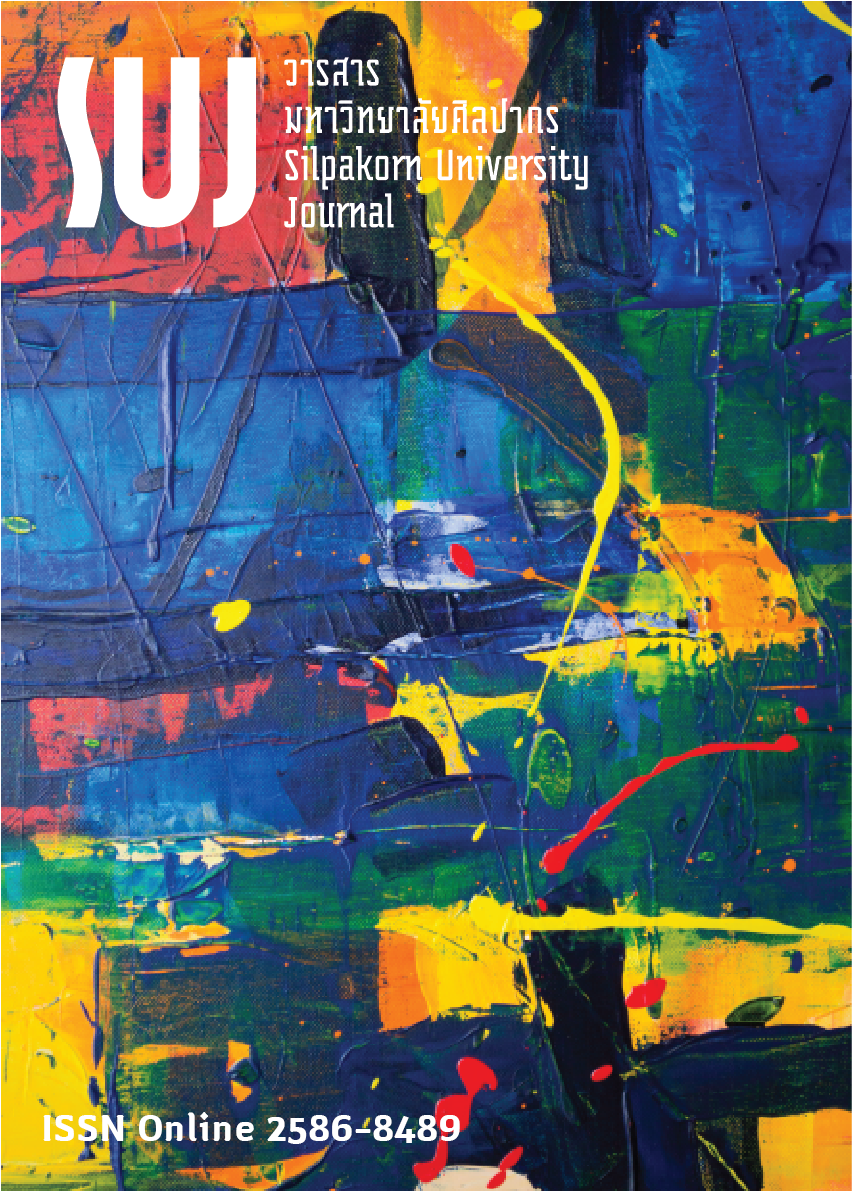การให้คำปรึกษาเพื่อการฟื้นฟูสมรรถภาพคนหูหนวก (Rehabilitation counseling for deaf people)
Main Article Content
Abstract
การให้คำปรึกษาเพื่อการฟื้นฟูสมรรถภาพสำหรับคนหูหนวก เป็นกระบวนการสื่อสารระหว่างนักให้คำปรึกษาและผู้รับบริการที่เป็นคนหูหนวกที่เผชิญกับปัญหาความคับข้องใจในเรื่องต่าง ๆ เพื่อช่วยให้พวกเขามีความเข้าใจในตนเอง ยอมรับข้อจำกัดของตนเอง ผู้อื่นหรือสิ่งที่มีอิทธิพลทางสังคม รวมถึงการเรียนรู้ที่จะรับมือกับสถานการณ์ที่กำลังเผชิญอยู่ และสามารถผ่านพ้นวิกฤติการณ์ของชีวิตด้วยวิธีการคิดบวก
คนหูหนวกนิยมรับคำปรึกษาจากนักให้คำปรึกษาที่เป็นคนหูหนวกเหมือนกัน จึงเป็นความคาดหวังของวงการวิชาชีพนักให้คำปรึกษา ที่ต้องการให้มีนักให้คำปรึกษาสำหรับคนหูหนวกเพิ่มมากขึ้น ทั้งที่เป็นคนหูหนวก และคนที่มีการได้ยิน โดยนักให้คำปรึกษาต้องเป็นผู้ที่มีประสบการณ์ทั้งในบริบทของการให้คำปรึกษา และการทำงานร่วมกับคนหูหนวก มีทัศนคติที่ดี มีความรู้ความเข้าใจ และยอมรับในความแตกต่างของวัฒนธรรมของพวกเขาได้อย่างไม่มีเงื่อนไข โดยเฉพาะอย่างยิ่ง ควรมีความสามารถใช้ภาษามือ เพื่อการสื่อสารที่ดีในการสร้างสัมพันธภาพกับคนหูหนวก ให้สามารถรับ - ส่งข้อมูลระหว่างสองภาษาได้อย่างถูกต้องเหมาะสม ทั้งนี้ได้เสนอแนะให้ภาครัฐ เห็นความสำคัญของวิชาชีพนักให้คำปรึกษาสำหรับคนหูหนวก (Deaf Counselor) โดยนักให้คำปรึกษาที่เป็นคนที่มีการได้ยิน และเป็นคนหูหนวก มีตำแหน่งนักให้คำปรึกษาสำหรับคนหูหนวกใน
องค์กรที่ทำงานเกี่ยวข้องกับคนหูหนวก
Rehabilitation counseling for deaf and hearing impaired people is a communication process between the counselor and the deaf and hearing impaired people. The objectives of providing rehabilitation counseling service are to assist the deaf and hearing impaired people to better cope with the frustrations they encounter in their daily life and to help them develop self-awareness and self-understanding as well as to accept, not only their own limitations, but the limitations of others and the influence of social factors. In addition, this will help them to learn how to handle their different situation and use positive thinking to get through life crisis.
It is commonly preferred by the deaf and hearing impaired to receive counseling from those who have the same challenges and disabilities. Therefore, it is widely hoped among counseling professionals to increase the number of both disabled and non-disabled counselors. The desired qualifications of counselors should include having experience in counseling and working closely with the deaf and hearing impaired, a positive attitude, and an unconditional understanding and acceptance of cultural differences that exist for the Deaf and hearing impaired. Counselor should also be highly proficient in sign language and other non-verbal means of communication in order to fluently communicate and interpersonally associate with the Deaf and hearing impaired on a two-way basis. It is recommended that government agencies recognize the importance of individuals, both disabled and non-disabled, in the deaf and hearing impairment counseling profession. Organizations that work with the Deaf and hearing impaired should also offer rehabilitation counselor positions within the organization.
Downloads
Article Details
References
Kaplan, M. David., Tarvydas, M. Vilia and Gladding, T. Samuel. (2013). 20/20: A Vision for the Future of Counseling: The New Consensus Definition of Counseling. Journal of Counseling & Development, (92): 366-372. [Online]. Retrieved July 7, 2016 from https://www.counseling.org/docs/default-source/20-20/2020-jcd-article-consensus-definition.pdf?sfvrsn=76017f2c_2
Deaf Counseling Center. (n.d.). Counseling Done Differently : Explore the differences between traditional counseling methods versus Deaf Counseling Center’s methods. [Online]. Retrieved May 18, 2016 from http://www.deafcounseling.com/why-choose-us/
Guthmann, Debra. (2008). Counseling Deaf and Hard of Hearing Persons with Substance Abuse and/or Mental Health Issues : Is Cross Cultural Counseling Possible?. The Minnesota Chemical Dependency Program for Deaf and Hard of Hearing Individuals. [Online]. Retrieved July 2, 2016 from http://www.mncddeaf.org/articles/crossculture_ad.htm
Kay, Dee Dee (Diana). (2004). Considerations When Counselling Deaf Clients. Bachelor of Professional Arts, Athabasca University. [Online]. Retrieved May 25, 2016 from https://www.uleth.ca/dspace/bitstream/handle/10133/761/kay,%20dee%20dee.pdf?sequence=1
Lim Yoke Kwan, Lucy. (2016). Malaysian children born to deaf parents :Interaction and relationship in the family. Paper Presentation on the 5th WFD Asia Conference in 2016. October 17, 2016 McCullough, C.A., & Duchesneau. S.M. [Online]. Retrieved October 20, 2014 from https://www.surveymonkey.com/results/SM-TPSMZVXL/data-trends/
Littipanich, Chavapol. (2005) Adjustment to work environment of the first hearing impaired graduates of Ratchasuda college, Mahidol University with bachelor of art (Deaf studies) in academic year 2003. (การปรับตัวในการทำงานของบัณฑิตที่มีความพิการทางการได้ยิน ที่จบการศึกษาหลักสูตรศิลปศาสตรบัณฑิต สาขาหูหนวกศึกษา รุ่นที่ 1 ปีการศึกษา 2546 วิทยาลัยราชสุดา มหาวิทยาลัยมหิดล). Master’s dissertation, Ratchasuda College, Mahidol University, Nakhon Pathom, Thailand.
McCullough, C.A., & Duchesneau. S.M. (n.d.). [Online]. Retrieved October 20, 2014 from https://www.surveymonkey.com/results/SM-TPSMZVXL/data-trends/
Mitchell, E. Ross, Karchmer, A. Michael. (2002). Chasing the Mythical Ten Percent: Parental Hearing Status of Deaf and Hard of Hearing Students in the United States. Sign Language Studies, 5(2): 231-244. [Online]. Retrieved October 11, 2016 from file:///C:/Users/p&p/Downloads/Chasing_the_Mythical_Ten_Percent_Parental_Hearing_.pdf
Naovanan, Malynn. (2014). Self - Esteem between Students with hearing impairment and hearing students (ความภาคภูมิใจในตนเอง ของนักศึกษาที่มีความบกพร่องทางการได้ยิน และนักศึกษาที่มีการได้ยิน). Master’s dissertation, Ratchasuda College, Mahidol University, Nakhon Pathom, Thailand.
Siegrist, Holly. (2011). Deaf People, Disability and Counselling Services: Understanding oppression and moving forward to empowerment. Master’s dissertation, The School of Sociology and Social Policy, The University of Leeds. Leeds, West Yorkshire, United Kingdom: UK.
Sussman, Allen & Stewart, Larry. (1971). Counseling with Deaf People. Deafness Research and Training Center. [Online]. Retrieved October 13, 2016 from http://files.eric.ed.gov/fulltext/ED058689.pdf
Wang Li-Sa. (2016). Hearing parent, deaf child : Journeying towards communication competency as a family in Singapore. Paper Presentation on the 5th WFD Asia Conference in 2016. October 17, 2016.
Whyte, Aimee K. and Guiffrida, Douglas A. (2008). Counseling Deaf College Students : The Case of Shea. Journal of College Counseling. 11(2): 184-192. [Online]. Retrieved September 15, 2016 (Mahidol University, Wiley Online Library) from http://onlinelibrary.wiley.com/doi/10.1002/j.21611882.2008.tb00034.x/pdf
Whyte, Aimee K., Aubrecht, Alison L., McCullough, Candace A., Lewis Jeffrey W. & Danielle Thompson-Ochoa. (2013). Understanding Deaf people in counseling contexts. Counseling Today. [Online]. Retrieved September 15, 2016 from http://ct.counseling.org/2013/10/understanding-deaf-people-in-counseling-contexts/


